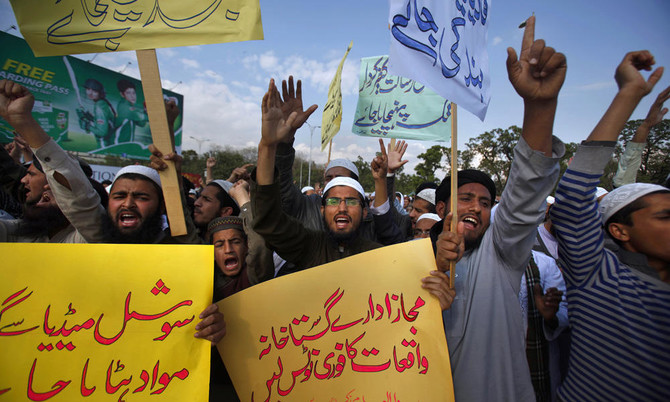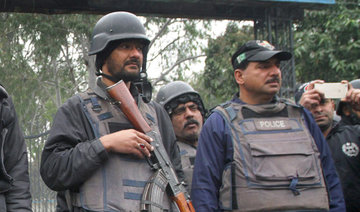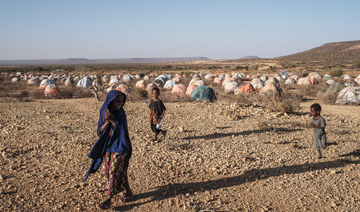ISLAMABAD: Ahmad Waqas Goraya couldn’t see anything through the black hood, but he could hear the screams.
A Pakistani blogger with a penchant for criticizing Pakistan’s powerful military and taking the government to task, Goraya was kidnapped in January along with four other bloggers.
“I could hear the screams of torture,” he said, struggling for words as the memories flooded back. “I don’t even want to think about what they did.”
But that wasn’t the worst of it, he said in a telephone interview with The Associated Press. More terrifying was the accusation of blasphemy — punishable by death in Pakistan — hurled at him and his fellow bloggers. They were held in what Goraya called a “black site” on the edge of Lahore that some say is run by Pakistan’s powerful intelligence agency.
Analysts and social media monitors say the blasphemy law is a powerful tool to silence critics. Some say it is being used by extremists to silence moderates at a time when Pakistanis are increasingly speaking out against violence and extremism, and voicing support for a government crackdown on Islamic militants.
In Pakistan, even the suggestion of blasphemy can be tantamount to a death sentence. It has incited extremists to take the law into their own hands and kill alleged perpetrators, often forcing people to flee the country, as Goraya and the other bloggers have.
Pakistan’s government heightened concerns earlier this week when it said it had asked Facebook and Twitter to ferret out Pakistanis posting religiously offensive material, promising to seek their extradition if they are out of the country and prosecute them on blasphemy charges if they are in Pakistan.
In one high-profile case six years ago, Punjab Gov. Salman Taseer was gunned down by one of his guards, who accused him of blasphemy because he criticized the law and defended a Christian woman sentenced to death for allegedly insulting Islam’s Prophet Muhammad.
“Right now they have made sure I cannot come back to Pakistan by introducing blasphemy charges,” Goraya said.
The lawyer who is arguing the case against the bloggers, Tariq Asad, has openly called for their deaths, while praising outlawed Sunni militant groups who want the country’s minority Shiites declared non-Muslims.
“They should have been killed,” Asad told the AP in an interview this week. “If I had the opportunity I would have killed them.”
Asad smiled at the suggestion that invoking the blasphemy law subdues the media and frightens social media activists.
“They should be scared,” he said.
The blasphemy charges against the bloggers being heard in Islamabad’s High Court were filed by Salman Shahid, who has ties to Pakistan’s Red Mosque, a hotbed of Islamic militancy where hundreds were killed in 2007 after security forces ended a months-long standoff with militants holed up inside. Asad is Shahid’s lawyer.
Zahid Hussain, a defense analyst and author of several books on militancy in the region, said invoking the blasphemy law is a form of “pushback” against the proliferation of news outlets and social media that amplify moderate voices.
Extremists “are trying to reassert themselves with this ideological battle and the easiest thing for them to use is the blasphemy law,” he said.
Hamid Mir, a popular Pakistani news anchor, says both media owners and journalists operate under a cloud of fear. Threats come from a variety of quarters in Pakistan, including the powerful spy agencies, but the most frightening are from those who would use the blasphemy law, he said.
Mir was shot six times in a drive-by shooting in Karachi three years ago. The culprits were later said to have been killed, but Mir pointedly accused Pakistan’s intelligence agency at the time.
“I am not afraid of bullets or bombs,” he said in an interview this week in his office in Islamabad. Even with three of the six bullets still in his body, he has refused to leave Pakistan.
But now he is having second thoughts. Last year, he was charged with blasphemy after writing a column condemning those who would kill in the name of honor following the burning death of a young girl.
“It broke me,” he said. “Here I had done nothing wrong and for four months I faced this blasphemy charge. Then I thought I should leave my country.”
Asad, the attorney prosecuting the bloggers, also argued the case against Mir.
A group of senior lawyers in Pakistan told Mir there was only one lawyer who could defend him, Rizwan Abbasi, who was defending the seven militants accused in the deadly 2008 multi-pronged assault in Mumbai, India, which killed 127 people. Abbasi had also defended Hafiz Saeed, the founder of the outlawed Lashkar-e-Taiba group and one of India’s most wanted men.
“I thought if the judge saw him by my side he would think ‘if he is with him then I won’t get into trouble if I free him,’” said Mir, explaining that judges and lawyers fear retaliation from militants if they exonerate someone of blasphemy.
But even Abbasi needed help. He had Mir send his column to five of the country’s top clerics to ask if it contained anything blasphemous. They all rejected the charge and it was dropped, but Mir says his approach to journalism has changed.
“I don’t talk about human rights any more. . . You become selective in your criticism,” he said.
The Committee to Protect Journalists and Amnesty International have spoken out against the abduction of the bloggers and expressed concerns about growing fears within Pakistan’s journalist community brought about by the use of the blasphemy law.
“It’s not the elected government that is putting pressure on the media, but journalists express fear of offending religious and militant groups, and the military and intelligence organizations,” said Steven Butler, the CPJ’s Asia program director. “The latest fear is of being labeled as ‘blasphemer’ and that this could lead to attacks.”
Prime Minister Nawaz Sharif did nothing to allay fears earlier this week when he demanded a review of social media to seek out offensive content, and when his interior minister said the government had reached out to Facebook and Twitter.
Facebook said it reviews all government requests carefully, “with the goal of protecting the privacy and rights of our users.” Twitter declined to comment.
In the past, Pakistan has banned YouTube after the circulation of videos deemed offensive to Islam.
“Our argument has never been about the law, but what is most dangerous is how it is used in Pakistan,” to stifle critics and muffle moderate voices, said Haroon Baloch with the Islamabad-based Internet advocacy group Bytesforall. He said radical religious groups use social media to attack moderate views, but there have been no restrictions imposed on them.
In an open letter to Pakistan’s interior minister, Amnesty International earlier this month asked that the government “protect journalists, bloggers, civil society and other human rights activists who are facing constant harassment, intimidation, threats and violent attacks in the country.”
Goraya, the blogger, is still haunted by his three weeks of captivity at the black site, where he said several cells were overcrowded with men both young and old, many of them in chains. One of his eardrums is damaged and he no longer has feeling in one hand.
“I was tortured beyond limits, beatings, different equipment used, psychological torture,” he said.
Blasphemy charges create climate of fear for Pakistani media
Blasphemy charges create climate of fear for Pakistani media

Two French prison officers killed in inmate's escape

- The incident took place late morning at a road toll in Incarville in the Eure region of northern France
- The inmate was being transported between the towns of Rouen and Evreux in Normandy
ROUEN, France: Gunmen on Tuesday attacked a prison van at a motorway toll in northern France, killing at least two prison officers and freeing a convict who had been jailed last week.
President Emmanuel Macron vowed that everything would be done to find those behind the attack as hundreds of members of the security forces were deployed for a manhunt to find the attackers and the inmate who were all still at large.
Two prison officers were killed in the attack and two others are receiving urgent medical care, Paris prosecutor Laure Beccuau said in a statement.
The incident took place late morning at a road toll in Incarville in the Eure region of northern France, a source close to the case added.
The inmate was being transported between the towns of Rouen and Evreux in Normandy.
A police source said several individuals, who arrived in two vehicles, rammed the police van and then fled.
One of them was wounded, the police source said.
It was not immediately clear how many attackers there were in total.
"Everything is being done to find the perpetrators of this crime," Macron wrote on X.
"We will be uncompromising," he added, describing the attack as a "shock".
Justice Minister Eric Dupond-Moretti immediately headed to a crisis cell at his ministry.
"These are people for whom life counts for nothing. They will be arrested, they will be judged and they will be punished according to the crime they committed," he said.
Both the officers killed were men and they were the first prison officers to be killed in the line of duty since 1992, he added.
One of them was married and had two children while the other "left a wife five months pregnant", he said.
"I am frozen with horror at the veritable carnage that took place at the Incarville toll," said Alexandre Rassaert, the head of the Eure region council.
"I hope with all my heart that that the team of killers which carried out this bloody attack will be arrested quickly."
A unit of the GIGN elite police force has been despatched to apprehend the suspects.
Traffic was stopped on the A154 motorway where the incident took place.
Interior Minister Gerald Darmanin wrote on X he had ordered the activation of France's Epervier plan, a special operation launched by the gendarmerie in such situations.
"All means are being used to find these criminals. On my instructions, several hundred police officers and gendarmes were mobilised," he said.
Prosecutor Beccuau named the inmate as Mohamed Amra, born in 1994, saying that last week he had been convicted of aggravated robbery and also charged in a case of abduction leading to death.
The case has been handed to prosecutors from France's office for the fight against organised crime known by their acronym JUNALCO.
Law and order is a major issue in French politics ahead of next month's European elections and the incident sparked fierce reactions from politicians, especially the far right.
"It is real savagery that hits France every day," said Jordan Bardella, the top candidate for the far-right National Rally (RN) which is leading opinion polls for the elections.
Indonesia’s president-elect seeks to boost defense ties with UAE

- Prabowo Subianto is set to succeed President Joko Widodo in October
- His visit to Abu Dhabi seen as a strategic move ahead of presidency
JAKARTA: Indonesia’s President-Elect Prabowo Subianto wants to boost defense ties with the UAE, his office said on Tuesday, as he made the first official trip to Abu Dhabi since winning the general vote.
Indonesia-UAE relations grew under incumbent Indonesian President Joko Widodo, who in 2021 secured an over $46 billion investment commitment from the Gulf state. A year later, the two countries signed a free trade deal, which came into force last September.
Subianto, a former special forces commander and Indonesia’s current defense minister, is set to succeed Widodo and take office in October following his landslide victory in the presidential election in February.
On Monday, he was in Abu Dhabi to receive the UAE’s highest civilian honor, the Order of Zayed, in recognition of his efforts in enhancing bilateral ties.
“I hope Indonesia-UAE relations will continue to develop and grow in accordance with the ambitions of the two countries in strengthening cooperation across various fields, including in defense,” Subianto said in a statement after meeting UAE President Sheikh Mohammed bin Zayed Al-Nahyan.
During Subianto’s time in office as minister, Indonesia and the UAE agreed to strengthen defense ties with the signing of a memorandum of understanding in 2020, followed by a protocol agreement on the development of their defense industries in 2022.
Subianto’s visit to the UAE can be seen as a strategic move ahead of his presidency.
“As we get closer to his inauguration, Prabowo has gained a boost in confidence to directly meet with MBZ and discuss strategic issues at the bilateral, regional and global level,” said Teuku Rezasyah, an international relations expert from Padjadjaran University in West Java.
“It’s only natural that Prabowo is visiting Abu Dhabi because it’s one of the world’s biggest sources of foreign investments … Certainly, Prabowo wants to seriously guarantee that investments from Abu Dhabi will be very strategic in the development of Indonesia.”
India sets sights on Iranian port as gateway to Afghanistan, Central Asia

- New Delhi signed a 10-year deal to operate Chabahar port on Monday
- India began helping Iran to develop Chabahar in 2016
NEW DELHI: India’s newly signed deal to operate the Iranian port of Chabahar is expected to provide it a gateway to landlocked Afghanistan and Central Asia, offering possible competition to Pakistan’s Gwadar.
The 10-year contract, under which India will invest $120 million in Chabahar’s infrastructure, was signed in Tehran on Monday between the state-owned Indian Ports Global Ltd and the Port & Maritime Organization of Iran.
India’s Shipping Minister Sarbananda Sonowal welcomed the deal, saying the development of Chabahar was an “India-Iran flagship project” and that the port would be a “gateway for trade with Afghanistan and broader Central Asian countries.”
New Delhi’s commitment to Chabahar started in May 2016 when Iran, India, and Afghanistan signed a trilateral transit agreement to develop the port into a regional trade hub.
“The signing of the deal signifies the strength of bilateral ties between India and Iran,” said D.P. Srivastava, who was India’s ambassador to Iran when talks on the project started.
“The present agreement will build on progress achieved so far.”
India’s 2016 involvement in Chabahar came after the US eased sanctions on Iran. The sanctions were reimposed by Donald Trump’s administration in 2018.
After the signing of Monday’s agreement, US State Department spokesperson Vedant Patel told reporters that the sanctions on Iran remained in place, and that Washington would enforce them.
Prof. Sujata Ashwarya from the Centre for West Asian Studies at Jamia Millia Islamia in New Delhi said it was not likely that sanctions would affect India, as its presence was helping deter China — the main rival of the US — from becoming involved in the Iranian port.
“(India) will effectively keep China out of the project,” Ashwarya said. “If we are there, then China won’t be there, and the US would not impose sanctions.”
Located in Iran’s southeast, Chabahar is less than 100 km from Gwadar in southwestern Pakistan — a flagship project of the multibillion-dollar China–Pakistan Economic Corridor under Beijing’s Belt and Road Initiative.
Ashwarya said the Iranian port is Gwadar’s potential competitor.
“It is an investment in trade facilitation with an eye on making Chabahar a hub,” she said.
“It provides competition to Gwadar, it could potentially lead to a secured corridor to Afghanistan and Central Asia, which means that India’s trade with these regions can flourish and broaden.”
Haldiram’s: India’s beloved snack maker eyed by foreign investors Blackstone, UAE wealth fund

- Haldiram’s started in 1937 from “tiny shop” in Bikaner in desert state of Rajasthan
- Haldiram’s has almost a 13% share of India’s $6.2 billion savoury snacks market
From fried Indian snacks to local sweet delicacies, family-run Indian snack maker Haldiram’s has long been one of the country’s most popular food brands. Now, foreign investors like Blackstone and Abu Dhabi Investment Authority want a big bite of it.
Haldiram’s was last year also an acquisition target for India’s Tata Group, one of the country’s biggest conglomerates.
Here are some facts about the popular Indian brand:
* Haldiram’s started in 1937 from a “tiny shop” in Bikaner in the western desert state of Rajasthan. It later expanded to New Delhi in 1983.
* The company’s website says it has 1,000 distributors and its products are available in 7 million outlets. It also exports to many foreign countries including Japan, Russia, United Kingdom and Australia.
* One of its most popular snacks is “bhujia,” a crispy fried Indian snack made with flour, herbs and spices and sold for as little as 10 rupees (12 US cents) across mom-and-pop stores. Haldiram’s calls it “an irresistible Indian snack” which can “captivate your taste buds.”
* Haldiram’s started exporting products in 1993. The US was its first market, where it began with 15 savoury products, and later, in 2016, opened its first overseas factory in the UK.
* Beyond snacks, Haldiram’s also sells ready-to-eat and frozen foods such as Indian curries and rice items. It also runs more than 150 restaurants which sell street-style Indian food, as well as Chinese and western cuisine.
* Last year, during deal talks with Tata, Haldiram’s was seeking a $10 billion valuation. Reuters has previously reported Haldiram’s annual revenues are around $1.5 billion.
* Haldiram’s has almost a 13% share of India’s $6.2 billion savoury snacks market, Euromonitor International estimates.
($1 = 83.5200 Indian rupees)
Internally displaced people reached 76 million in 2023 – monitoring group

- Almost 90 percent of the total displacement was attributed to conflict and violence
- The group reported a total of 3.4 million movements within Gaza in the last quarter of 2023
GENEVA: Conflicts and natural disasters left a record nearly 76 million people displaced within their countries last year, with violence in Sudan, Congo and the Middle East driving two-thirds of new movement, a top migration monitoring group said Tuesday.
The Internal Displacement Monitoring Center report found that the number of internally displaced people, or IDPs, has jumped by 50 percent over the past five years and roughly doubled in the past decade. It doesn’t cover refugees — displaced people who fled to another country.
The report tracks two major sets of information. It counted 46.9 million physical movements of people in 2023 — sometimes more than once. In most of those cases, such as after natural disasters like floods, people eventually return home.
It also compiles the cumulative number of people who were living away from their homes in 2023, including those still displaced from previous years. Some 75.9 million people were living in internal displacement at the end of last year, the report said, with half of those in sub-Saharan African countries.
Almost 90 percent of the total displacement was attributed to conflict and violence, while some 10 percent stemmed from the impact of natural disasters.
The displacement of more than 9 million people in Sudan at the end of 2023 was a record for a single country since the center started tracking such figures 16 years ago.
That was an increase of nearly 6 million from the end of 2022. Sudan’s conflict erupted in April 2023 as soaring tensions between the leaders of the military and the rival Rapid Support Forces broke out into open fighting across the country.
The group reported a total of 3.4 million movements within Gaza in the last quarter of 2023 amid the Israeli military response to the Oct. 7 attacks in Israel. That means that many people moved more than once within the territory of some 2.2 million. At the end of the year, 1.7 million people were displaced in Gaza.
Group director Alexandra Bilak said the millions of people forced to flee in 2023 were the “tip of the iceberg,” on top of tens of millions displaced from earlier and continuing conflicts, violence and disasters.
The figures offer a different window into the impact of conflict, climate change and other factors on human movement. The UN refugee agency monitors displacement across borders but not within countries, while the UN migration agency tracks all movements of people, including for economic or lifestyle reasons.



















